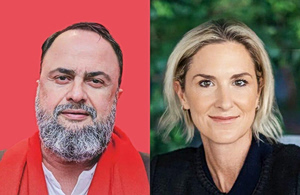CHICAGO— Kamala Harris frequently recalls her mother telling her that she might be “the first to do many things” but to make sure she isn’t the last. Yet as Harris formally accepted the Democratic presidential nomination Thursday, the vice president didn’t directly invoke the historic nature of her candidacy.
Instead of leaning into what her campaign thinks is obvious, the 59-year-old former California senator and prosecutor tried to accomplish something she has struggled to do since her unsuccessful presidential bid in 2019: provide a clear picture to Americans of what she stands for—and why .
“I will be a president who unites us around our highest aspirations,” Harris said. “A president who leads—and listens. Who is realistic, practical and has common sense. And always fights for the American people. From the courthouse to the White House, that has been my life’s work.”
Harris used the prime-time address to pitch Americans on her central campaign message since unexpectedly replacing President Biden at the top of the Democratic ticket: She portrayed her opponent, former President Donald Trump as a threat to freedom, arguing she has a more forward-looking agenda on protecting abortion rights and on expanding economic mobility for the middle class.
“Donald Trump is an unserious man, but the consequences of putting Donald Trump back in the White House are extremely serious,” Harris said during her speech. “Consider not only the chaos and calamity when he was in office, but also the gravity of what has happened since he lost the last election,” she said, referring to the Jan. 6, 2021, riot at the Capitol.
Trump reacted in real time on his Truth Social platform, saying Harris and Biden had years to address some of the problems they outlined at the DNC. He accused the Democrats of failing on the border and violent crime—and rebutted Harris’s claim that Republicans would seek to further restrict abortion rights. “I TRUST WOMEN,” Trump wrote in all caps. “She’s done nothing for three and a half years but talk, and that’s what she’s doing tonight, she’s complaining about everything but doing nothing!” Trump wrote.
Harris is the nation’s first Black vice president. If she wins in November, as the first woman or person of South Asian descent in the Oval Office, she will face steep challenges in unifying a divided electorate around her vision for the country.
The vice president sought to allay those concerns, saying the nation has a “precious, fleeting opportunity to move past the bitterness, cynicism and divisive battles of the past.”
Harris also emphasized elements of her biography—such as her upbringing by a middle-class, immigrant mother—to portray herself as an authentic and relatable messenger for her priorities.
“Building that middle class will be a defining goal of my presidency,” Harris said. “And I’ll tell you, this is personal for me. The middle class is where I come from.”
She offered a personal account of her family’s unlikely path to America and her decision to become a prosecutor. Harris recalled the journey of her mother, Shyamala Harris, who traveled from India to California at age 19 “with an unshakable dream to be the scientist who would cure breast cancer.”
In high school, Harris said she noticed her best friend, Wanda, was sad at school. Harris said she later learned that her friend was being sexually abused by her stepfather. Harris remembered telling her friend that she had to come stay with her family.
“This is one of the reasons I became a prosecutor,” she said. “To protect people like Wanda, because I believe everyone has a right to safety, to dignity, and to justice.”
With early voting beginning in some states in about a month and Election Day just over two months away, she has limited time to reintroduce herself as a leader in her own right. Biden stepped away from the race in July, the first president to abandon a re-election campaign since 1968, and endorsed Harris to succeed him.
Part of Harris’s task going forward will be to maintain the momentum of the first month of her candidacy while continuing to characterize Trump—who is about two decades older than her—as a relic of the past. Her team will also need to deny Trump the mantle of an outside change agent when Harris remains closely tied to Biden’s policies and as surveys show that many Americans yearn for change.
David Axelrod , a top strategist for former President Barack Obama ’s campaigns, said Harris could make a compelling case.
“The fight right now is whether the Trump folks can push her back into the box of being an incumbent and hold her accountable for the things that Biden has done, or whether she can continue on this path as the choice to turn the page,” Axelrod said.
Although Harris’s popularity has surged since her whirlwind ascent to the top of the Democratic ticket, in a recent CBS News poll, over a third of respondents said they didn’t know what she stands for.
Harris during her speech drew sharp contrasts between herself and Trump on issues such as taxes and abortion rights, warning that the president would slash taxes on the wealthy and increase tariffs on goods from foreign countries. She likened the former president’s proposal to raise tariffs to a national sales tax—“call it a Trump tax,” she said.
On abortion, Harris blamed Trump for putting into place the Supreme Court justices who in 2022 overturned Roe v. Wade, which had established a constitutional right to abortion. She accused Trump of preparing for a nationwide abortion ban —which the former president has denied he would pursue.
“Simply put, they are out of their minds,” Harris said. “And one must ask: Why exactly is it that they don’t trust women?”
She also addressed one of Trump’s biggest lines of attack head on: the Biden administration’s handling of the southern border. She blamed Trump for killing a bipartisan border-security bill that failed in the Senate earlier this year and said, as president, she would push for that legislation and sign it into law.
In recent days, Harris has begun rolling out parts of her agenda, releasing a vision to make housing more affordable while lowering the cost of groceries. Harris’s aides have said they want her agenda to provide a contrast with Trump without reading like a think-tank white paper.
Republicans, who have at times struggled to form a consistent line of attack against Harris, have criticized her for not providing detailed plans and tried to cast her as an out-of-touch liberal, pointing to her past support for the Green New Deal and Medicare for All.
Trump supporters also have tried to tie her to Biden’s policies on the economy and inflation and decisions such as the withdrawal of troops from Afghanistan, which have been unpopular with voters.
Surveying America’s standing around the globe, Harris made clear she would offer continuity on Biden’s foreign policy goals, promising to “stand strong with Ukraine and our NATO allies,” while working to end the Israel-Hamas war.
Harris said she was working with Biden “around the clock” to broker a cease-fire deal and release of hostages in the region. She pledged to defend Israel’s right to defend itself and end the humanitarian crisis in Gaza.
Polls show Harris and Trump locked in a tight race , with the vice president gaining on the former president in most surveys, which had previously shown Biden lagging, before he bowed out. Harris leads Trump by 3.6 percentage points in the FiveThirtyEight.com average of public polls.
But her lead in most polls is within the margin of error—and she trails in many polls of the battleground states. “This is a dead heat,” said Jen O’Malley Dillon , Harris’s campaign chair, during an event this week. “We are winning some battleground states and we are losing some.”
On Tuesday, Harris’s husband, Doug Emhoff , described a warm, family-focused person , who his children know as “Momala” and who officiated at his son’s wedding. Harris’s speech came on their 10th wedding anniversary.
The chance for America to elect the first woman to serve as president—the strongest opportunity since Hillary Clinton’s candidacy in 2016—wasn’t lost in Thursday’s programming, though it wasn’t always explicit.
Rep. Annie Kuster (D., N.H.), who is retiring from Congress after a dozen years, was one of many attendees who wore suffragist white inside Chicago’s United Center, as many House Democrats have done during State of the Union addresses since the rise of Trump. Harris wore a dark suit and didn’t talk of breaking the glass ceiling, as Clinton did earlier in the week.
“I have been waiting my entire life. It makes me really tearful,” Kuster said, noting her late mother’s long involvement in New Hampshire politics. “We’ve given our lives to this.”
Write to Tarini Parti at tarini.parti@wsj.com and Ken Thomas at ken.thomas@wsj.com




